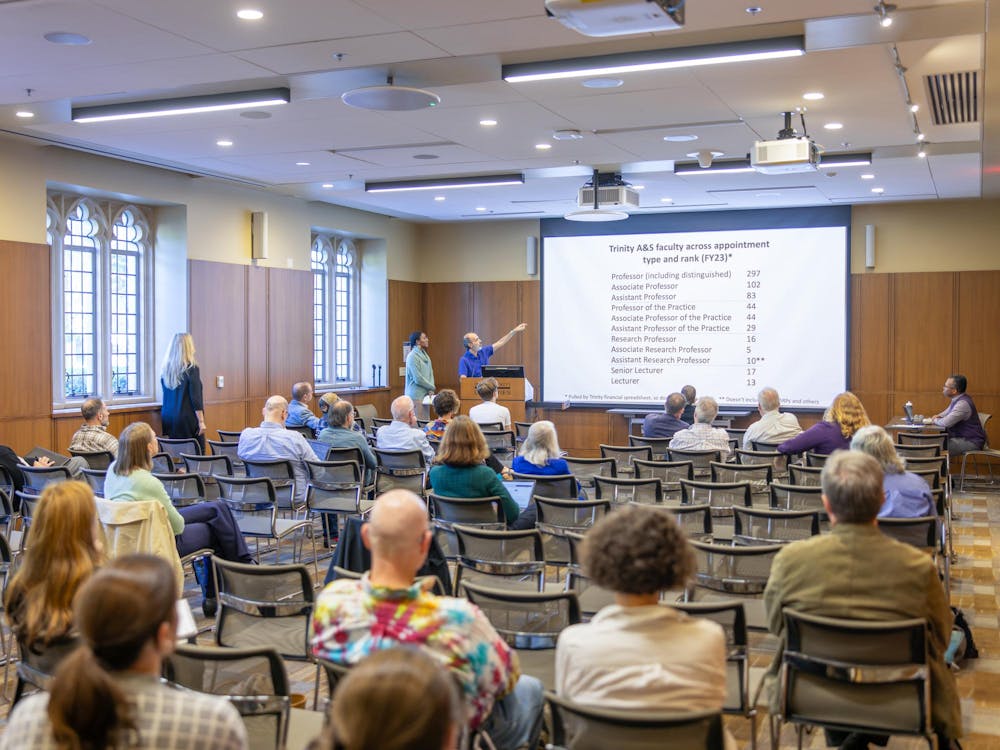The Arts & Sciences Council’s Committee on Undergraduate Teaching announced that it is considering phasing out the Short-Term Incapacitation Form (STINF) during the council’s Thursday meeting.
The form allows students to request an excused absence or extensions on assignments due to a short-term illness or injury. It does not require students to disclose specifics or provide any documentation, though individual professors may require more information. Students can only submit the form for up to three consecutive days, and professors have final discretion to accept or reject the form.
“Nobody thinks it's working and doing what it should,” said Denise Comer, professor of the practice of the Thompson Writing Program and chair of the council. “In fact, it is causing a lot of confusion and counterproductive results.”
She referred to a Duke Student Government representative on the committee who provided similar feedback. Comer further encouraged council members to consult with colleagues to determine if there are any dissenting opinions.
In a Friday email to The Chronicle, the DSG representative on the A&S committee clarified that she “very clearly did not agree" with the statement made by Comer in the meeting.
However, Comer clarified that “nobody is talking about any kind of universal policy.”
During the remainder of the meeting, the council heard a report on faculty demographics describing trends on the gender gap, religious microaggressions and job satisfaction rates, and held a brainstorming session for future council meetings.
Faculty demographics report
The council heard a presentation on Duke’s organization and faculty demographics by Mohamed Noor, executive vice provost and professor of biology, and Sherilynn Black, associate vice provost for faculty advancement and assistant professor of the practice of medical education.
They noted that the data was not gathered from the same platform — advising that the council consider the conclusions as “demonstrative rather than precise” — but emphasized that the report still contained many illustrative insights.
“There's a trend towards more representation,” Noor said. “We have a ways to go, but the trend is in a good direction.”
The report found that the gender gap in faculty positions has been steadily decreasing over the past decade. Additionally, representation among Black, Latino and Asian faculty members has increased in recent years.
According to Black and Noor, the deans of each school will be responsible for implementing efforts to resolve ongoing inequities that will be “contextually specific to each of the schools.”
The report noted that 71% of Jewish community members claimed they have experienced at least one microaggression due to their religion, while 70% of Muslim members said the same.
It also addressed the increasing number of new non-senior track faculty hires as opposed to tenure-track faculty at 52% and 5%, respectively. Noor stated that much of this discrepancy can be attributed to unit hiring practices, “conversion from non-regular rank to regular rank,” and an increase in strategic hires, such as recruiting experts in niche fields.
According to Black, non-regular rank faculty had the lowest job satisfaction rates of any faculty group, who noted in particular that they “received inconsistent and inadequate mentorship.”
Non-tenure track and non-regular rank faculty were among those most likely to say they had “second thoughts” or “would not choose to come to Duke.” Both groups said their doubts stemmed from concerns about job stability, compensation, stress levels and working in a supportive environment.
“A lot of what we hear in our office about feelings — maybe of disenfranchisement or feelings of individuals not feeling that they're valued — … is reflected in this data,” Black said. “That’s just something for you all to think about.”
Some council members expressed interest in commissioning a report on the proportion of new hires in administrative positions at the University, as administrative hires are outpacing non-administrative ones nationwide.
In other business
Get The Chronicle straight to your inbox
Sign up for our weekly newsletter. Cancel at any time.
Comer addressed the ongoing Israel-Hamas war amid heightened tensions in the Middle East, the first anniversary of Oct. 7, 2023, the war in Ukraine and armed conflict in “other places.”
“We — our colleagues, our staff, our students — are all impacted in varying ways,” she said, asking council members to come forward with suggestions for supporting University community members impacted by the conflicts.
The meeting concluded with a brainstorming session to generate ideas to discuss in future sessions. Suggestions included discussions speaking to the admissions office about their procedures, institutional neutrality, freedom of expression, support for the library and the state of athletics.
Editor's note: This article was updated Wednesday evening with comment from the DSG A&S committee representative to clarify her position on the proposed STINF phaseout.
A previous version of the article stated that Noor attributed a discrepancy in hiring numbers to "union" hiring practices. The article has since been updated to attribute the numbers to "unit" hiring practices. The Chronicle regrets the error.
Darragh Senchyna is a first-year master's student in the Graduate School and a staff reporter for the news department.

